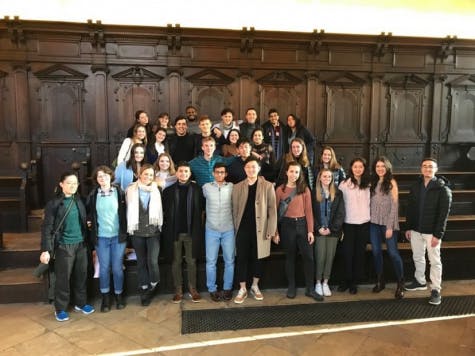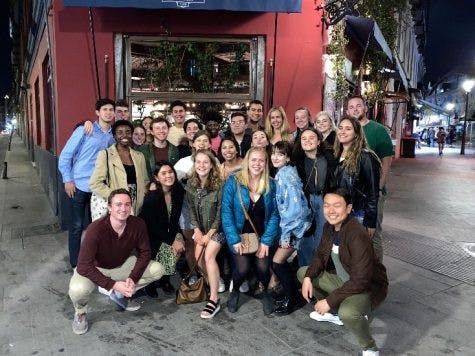While students on Middlebury’s Vermont campus worried last week about when they would next see friends, how to navigate remote coursework and where to go after school shut down, those enrolled in programs abroad were confronting the same worries, but with an added caveat: To make it home, many of them would have to travel halfway across the world amid a rapidly-spreading global pandemic.
Concerns over the Covid-19 virus have led colleges around the world to cancel study-abroad programs, and Middlebury’s own 16 programs have suffered the same fate. The college’s schools in China and Italy closed earlier this spring as the virus spread in those countries. Between March 10 and March 13, all remaining Middlebury schools abroad, from programs in Europe to Latin America, suspended their operations.
The college later put out a call for all students remaining in foreign countries — those in externally-sponsored programs or who had stayed in host countries after their Middlebury programs canceled — to return to the U.S on March 19, the day the State Department issued a Level Four Global Travel Advisory.
The result was several days of chaos and uncertainty for roughly 250 Middlebury students whose study abroad experiences had forcibly come to an end, as they sought to find their way home amid quickly-implemented travel bans and emerging facts about a mostly-unknown virus.
“‘Chaotic’ is the best way to describe it,” said Porter Bowman ’21.5, who was studying in Stockholm, Sweden through an independent program canceled on March 11.
Communication breakdowns
Students reported that occasionally poor communication from program coordinators, combined with rumors and bewildering information bites from national news sources, increased the stress of navigating cancellation of their programs and journeys home.
Kenzo Okazaki ’21 was enrolled in Middlebury’s CMRS program in Oxford, England, which was suspended on March 10. Students in his program became confused that morning, Okazaki said, after some of them received screenshots of the March 10 email in which Professor Héctor Vila leaked that the college would send students home from its Vermont campus later that week. Several nervous hours passed between when students first read Vila’s email and when they finally learned the fate of their own program from coordinators.

Middlebury students enrolled in the CMRS-Oxford program, which was canceled on March 10.
“I think everyone was frustrated that there wasn’t much of a heads up that our program might be shut down, so that at least people could start thinking about leaving more than six days in advance,” Okazaki said.
Abroad program coordinators have had to work “around the clock” to give direction to the movements of hundreds of students in programs across many time zones, according to Dean of International Programs Carlos Vélez. Vélez said the study abroad office made “every effort” to make decisions and update students on their programs’ status as quickly as possible, but that in any given country, information about travel advisories and restrictions “would change without warning, both from U.S. and local agencies.”
“One of the biggest challenges has been the relentless pace at which things have changed during this crisis,” he said.
Sometimes, lack of transparency from parties beyond students’ host institutions — like the president of the United States — caused problems. For students enrolled with Bowman in the DIS (Study Abroad in Scandinavia) Stockholm program, the hours between President Trump’s March 11 press conference, which aired at 2 a.m. Stockholm time on March 12, and the program’s official cancellation three hours later were “chaos.”
During that press conference, Trump announced he was banning all non-essential travel to and from Europe effective that Friday, failing to mention that U.S. citizens would still be able to travel freely. After the conference, assuming they would be unable to get back into the U.S., the Americans in Bowman’s program frantically rushed to make travel plans even without receiving confirmation that their program had ended.
“It was crazy,” Bowman said. “Flights were going like concert tickets.”
In an open letter written by Helene Gusman ’21 (who studied in Yaroslavl, Russia) and Megan Salmon ’21 (Santiago, Chile) and circulated the week of March 9, students in programs abroad called on the administration to provide clarity on their situations. They had never received President Laurie Patton’s email outlining the Vermont campus’s plan to shut down, according to the letter, and had to wait hours and sometimes days before receiving clarity on the status of specific schools abroad.
Vélez later clarified that messages sent to the “all student” mailbox are typically sent to students in abroad programs, but that a technical issue prevented the delivery of some such messages that week.
Gusman and Salmon’s letter received signatures from 40 students around the world; however, its writers ultimately chose not to send it to the administration after Trump announced his travel ban and abroad programs began to provide more information to students.
Trump’s travel ban caused panic for students across Europe. Gretchen Doyle ’21.5, who was studying in Middlebury’s program in Madrid, Spain, said she received a call from a friend at 5 a.m. local time on March 12 alerting her of the travel ban. Like Bowman, she was so concerned that she immediately bought a plane ticket home to New Jersey without waiting for confirmation of her program’s cancellation.

Students in Middlebury's Madrid program. Students there and across Europe scrambled to find flights home after President Donald Trump announced his European travel ban on March 11.
Doyle recognized the challenges posed to abroad program coordinators in uncertain times, but said she was still frustrated by a lack of communication from Middlebury.
“After Trump announced the travel ban and the majority of us had bought tickets to fly home, we didn’t hear anything from our program for a long time,” Doyle said. “I don’t blame anyone for the way things were handled because it was a stressful time for everyone, but I was frustrated.”
As confusing as Trump’s language in his press conference was for students, Vélez said that it was equally disruptive for the study abroad office. Though the press conference made it seem as though the travel ban would apply to all travelers, the study abroad office was not certain this was the case and decided to wait to make announcements until the U.S. State Department released its official proclamation on the travel ban, Vélez said.
“At that point, close to midnight in Vermont, all of our program directors communicated the correct information to all of our students abroad,” Vélez said.
Students worry about academic continuity
Just as students enrolled at Middlebury in Vermont worry about how coursework will continue as the college shifts to remote learning, those in programs abroad are wondering how curricula taught in different languages and across time zones will translate to life at home.
Okazaki’s coursework within the CMRS-Oxford program was largely focused on individual research in Oxford’s libraries, and weekly one-on-one check-ins with professors during which students are given rigorous feedback on written work. That intimate structure will not be easily replicated thousands of miles away from Oxford’s famed libraries, he said.
“The idea was to use Oxford's library and to become familiar with the resources you can get there that you can't get anywhere else in the world,” Okazaki said. “Well, now we are anywhere else in the world without a library.”
Other students, like Lila Sternberg-Sher ’21.5, had not even begun classes at their host universities when their programs shut down. Students in Sternberg-Sher’s Middlebury program in Temuco, Chile — as well as in all other programs in Latin America, where local university classes begin in mid-March — were given the option of receiving full refunds and forgoing academic credit for the semester or taking online classes through Middlebury’s program in Chile (not the public university where they had planned on taking classes).

Temuco, Chile at dusk.
Sternberg-Sher, a linguistics major, said she was disappointed that she will have to pass up on in-person linguistics research she was planning on doing in Temuco, but still plans to take remote classes from home.
“I’m lucky enough to be set up well within my major that it shouldn’t be a huge issue for me,” she said, adding that the Chile program is well-equipped for remote learning after navigating university shut-downs last fall.
Many students expressed relief that the Pass/D/Fail option would extend to those in abroad programs, like Hailey Kent ’21.5, who is directly enrolled in the University of Edinburgh, Scotland, where classes began in January.
“This did not make for a very academically fulfilling semester, and I am glad that Middlebury is extending its pass/fail policy to students abroad because I feel my grades are not accurate representations of the quality of the work I have completed,” she wrote in an email to The Campus.
Experiential learning
Though the week of March 9 was mostly stressful for students, many said it was eye-opening to see the varied responses of governments and populations of their host countries during one of the more frantic times in recent history.
In Madrid, Doyle and other students were surprised by the lax approach residents seemed to take to the virus in a city that news outlets have reported as a Covid-19 hotspot. They watched Madrid’s metro system, restaurants, cafes and sporting events running like normal, even as they heard from friends in the U.S that worry over the virus was heightening there.
“There were people out in the central park, Retiro, and out at bars until the day I left,” said Lilly Kuhn ’21.5.
Jess Cohen ’21, who was studying at the main public university in Buenos Aires, Argentina through a Middlebury program, observed similarly low concern over Covid-19 at first. Students’ host families, he said, were quick to denounce anxiety over the virus as overblown, and students in the program were similarly unworried. Once the Argentine government began to shut down public spaces on March 13 (the day Middlebury canceled its program there), Cohen said the seriousness of the situation began to sink in.
No matter the reaction of varying countries’ populations, students said worry over the virus significantly impacted the truncated time they had in their host countries.
“I read the news every night before going to bed and right when I woke up, and I usually couldn’t sleep through the night,” Doyle said. “It was difficult to immerse ourselves fully in Spanish culture because we didn’t know how much longer we’d be there, so it wasn’t the study abroad experience I had hoped for, to say the least.”
Some students, disappointed at the prospect of losing a semester of language and cultural immersion, pondered staying in their host countries even after Middlebury had suspended programs or their host universities had closed entirely.
Cohen initially planned to continue living with his host family and taking remote classes after the Middlebury program in Buenos Aires was suspended. By doing so, he thought, he could still obtain the Spanish-immersion experience he had gone to Argentina for in the first place while weathering the storm of Covid-19 in an area that seemed relatively unaffected.
“I felt like all of the students in my program who had decided to leave were surprised that I was going to stay — but they had all wanted to stay,” he said.
In the 24 hours after he made his initial decision, though, as Cohen watched the city shut down, he decided to head back to his home in Colorado. Even Buenos Aires, a part of the world that was largely untouched by the virus at the time of the Middlebury program’s cancellation, was closing bars, soccer stadiums, museums and restaurants — steps that were being replicated around the world to prepare for unknown effects of the rapidly-spreading pandemic.
“Streets that were usually totally full of people and cars were completely dead,” Cohen said. “All the shops other than the grocery stores and a couple of cafes were closed that normally would be full.”
Cohen scrambled to buy a ticket home on Saturday, March 14, and got one of the last flights out of the country before Argentina shut its borders on Sunday.
Okazaki said that, between the Oxford program’s cancellation on Tuesday and his Sunday departure, there wasn’t much time to be preoccupied. When he finally found his seat on a direct flight from Heathrow to Salt Lake City, though, he said a sense of calm washed over him.
“As soon as I got on the plane I realized how relieved I was and how lucky I was to get out of there,” Okazaki said. “I got home and realized that the U.K. was going to start being shut down, and realized how much crisis I had averted.”
Editor’s note: Porter Bowman ’21.5 is a news correspondent for The Campus.
Midd students scramble to get home as Covid-19 shuts down programs abroad

COURTESY OF JESS COHEN
Shuttered storefronts in Buenos Aires, Argentina, where Middlebury's programs abroad were canceled on March 13.
Shuttered storefronts in Buenos Aires, Argentina, where Middlebury's programs abroad were canceled on March 13.
COURTESY OF KENZO OKAZAKI
COURTESY OF GRETCHEN DOYLE
COURTESY OF LILA STERNBERG-SHER
Comments



